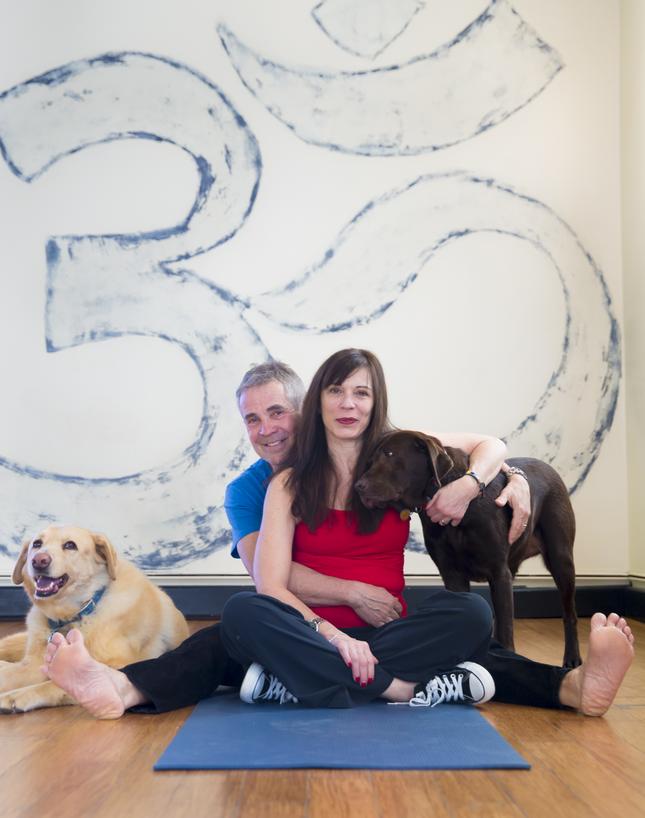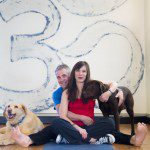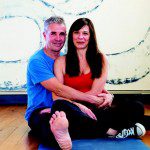When Patty Ivey opened Down Dog Yoga in 2003, her intention was to leave the teaching to her partner, yoga instructor Cathy Cox. But less than a year later, after Cox’s sudden relocation, she found herself in a roomful of sweating yogis, cue card in hand, calling out: “Step your right foot forward, warrior one.”
“I had no interest in teaching,” she recalled recently, sitting cross-legged on a yoga mat in her Georgetown studio. “I just wanted to run a business. I learned very quickly that that’s not how this works. Yoga is not a business. It is something very separate that then supports a business. It is spirited by the community.”
Today, with a $2-million business and an estimated 75,000 people having rolled out their mats in the flagship studio, she has come a long way from the days of teaching yoga with a cheat sheet.
With dark, straight bangs falling over brown eyes, she looks a decade younger than her 61 years. No doubt this is due in part to her daily practice of the heated vinyasa power yoga (also called “flow” yoga) offered at Down Dog, in which temperatures reach 90 to 95 degrees.
Along with her husband Scott Ivey, 62, she now owns studios in Bethesda and Herndon. There are plans to open a fourth in Clarendon in January. Around the same time, they hope to move into their new Georgetown space at the corner of Prospect and 34th Streets, Govinda Gallery’s home for 35 years. (Down Dog’s current location, by Dean & DeLuca, will be used to train teachers.)
Acknowledging the changes ahead, she said, “I didn’t plan it that way. But I’ve just got to jump into the flow.” She laughed. “That’s what vinyasa is, right? Absence of resistance.”
She looked at husband, seated nearby on a yoga block, who also laughed. With no official title — “We call him our director of smiles” — he is literally the happy face of the business, an enthusiastic student who can often be found on his mat alongside college students, professionals and carpool moms and dads.
The key to their successful partnership, he says, is that there’s only one boss. “It’s her baby, it’s her vision and she’s very good at it. So, why would I interfere? I just do my part.”
“He’s great at quietly supporting me and my vision, in the background,” she said. “But I work for myself because I don’t want to be told what to do.” She paused. “I’m the boss.” They laughed again.
Friends First
Patty may like being the boss, but she never dreamed she would one day own a yoga studio. In the 1980s, she owned retail bakeries called the Cookie Lady, but sold them in the early 1990s when her mother became ill. Needing a job with flexibility, she talked the manager of the Palm Restaurant into hiring her with no experience. That’s how she met Scott, the waiter assigned to train her.
“Scott gave me 20 bucks and said, ‘Don’t bother me,’” recalled Patty, looking squarely at Scott, who has short, graying hair. “That was the start of our relationship: not good. He called me an airhead. Isn’t that funny?”
“True,” Scott admitted, laughing.
Undaunted, Patty became good enough at her job to consistently win the wine-selling contest. She also started walking to work with Scott, who lived three blocks from her in Adams Morgan. Both divorced, they walked and talked together every day, gradually getting to know one another.
“He was just very aware, always a good listener,” Patty said, as Scott listened with a smile. “He never tried to fix anything. That’s what attracted me to Scott and his sensitive soul.”
Having given herself two years to figure out her next move, Patty attended massage school while waiting tables at the Palm. She then worked at the Four Seasons as a massage therapist for a year before starting a private practice. In 1998, she and Scott married and moved into the top-floor rental space of a large home at 29th and Q Streets.
A year later they moved to Dent Place, where they still live today with a cat and two shelter dogs: Elijah, a retriever-chow mix, and Coco, a chocolate lab. (They work actively with Lucky Dog Animal Rescue, started by one of their students, to help find dogs homes.) They picked Georgetown as their studio location because they wanted to walk to work and because — a recurrent theme — “community mattered to me,” said Patty.
Baptiste-Inspired
Yoga wasn’t something she actively sought out. But when a doctor suggested it as a way to rehab an injured knee, she found it healed more than her physical ailments. She had been through some emotionally rough years, including her divorce and the death of her mother.
“I had suffered from an eating disorder and had a pretty damaged sense of self,” she wrote in an email. “My yoga practice brought me back to feeling whole and complete.”
Her yoga teacher was Cox, who became her friend and then suggested they buy a yoga studio together. But though she felt the familiar entrepreneurial itch, she hesitated until Cox took her to a class at the studios of Baron Baptiste, a pioneer of power vinyasa yoga. Teaching the class that day was none other than Baptiste himself. It was life-changing.
“After that class I looked at her and said, ‘I’m in.’ I walked up to Baron and said, ‘What is your business model? Are you planning on opening studios?’”
That was in December 2002. Down Dog Yoga opened as the first Baptiste affiliate four months later.
Ups and Downs
Defying expectations, the studio made money from the start. Leslie Morgan Steiner, an author and Georgetown resident who has been going to Down Dog since 2005, said it paved the way for future studios in the neighborhood. “Patty showed that you could make money — and have a very good business — off of a Georgetown-based exercise studio, even a small one.”
Rolf Gates, a yoga teacher and former Baptiste partner whom Patty calls a mentor, goes as far as to say that Patty belongs to a generation of yoga teachers who pioneered modern yoga in America.
“They will go on a short list of people who entrepreneurially took a risk and opened a studio when yoga was practiced by a million people, and had the vision to bring it into a place today where yoga is practiced by 25 million people,” said Gates. “It’s impossible to calculate the impact of Down Dog.”
He also speaks admiringly of her and Scott’s “backbone and courage” through the ups and downs. As other studios — yoga, Pilates and even barre — opened in Georgetown, Scott and Patty’s biggest challenge came from within their own business: they were sued by a now former partner.
“The legal process was three years, and we came close to losing the company,” Patty said. “It would have been a lot easier to close down and start up again, and it would have cost a lot less money, but I wanted to keep this community together.”
It was during this time, she said, that she realized the importance of her yoga practice, which not only deepened and strengthened her personally, but ultimately strengthened her vision for the company.
“My yoga mat has become my best friend and my place that I come to do my inquiry work, the practice of who I’m being as a human being in my life,” she said. “How did I get here? How am I taking action? It takes us out of blame and brings us into our accountabilities.”
That self-awareness and accountability is what Patty tries to bring out in her students. She is considered by some to be a tough teacher. She said she doesn’t see her classes as hard, but she does ask that students “show up.”
“Many people aren’t used to that. They’re on auto-pilot. My request is, let’s actually show up and go through this with presence. It sometimes makes my classes feel more challenging.”
Dr. Jay Greenstein, a sports chiropractor who has taken Patty’s classes, says he is impressed by two aspects of her teaching: how she ensures her students’ safety by being a stickler for the mechanics, and how she emphasizes the mind-body connection. “People take for granted the mind component of the practice of yoga and how everything going on between the ears plays a role with your overall health,” he said.
Steiner says Patty has such high standards for herself and her students because she passionately believes in the power of yoga to change not just one’s body but one’s life. “She’s really into self-empowerment,” Steiner said. “She’s got such a big heart.”
Maybe more than anything, it’s that heart that pulses through Down Dog Yoga. What started out as a business venture for Patty has become her and Scott’s mission — one that has required persistence, faith, going with the flow and more than a few drops of sweat along the way. Their hope is that their students feel that, too, and — more importantly — find connection.
“The way I was trained through Baron is that when you’re standing up in front of that room, you’re teaching to a sea of humanity,” Patty said. “We know everyone in that room has something going on in their lives. We don’t know what, but we just need them to know we understand them. We’ve been there too.”





